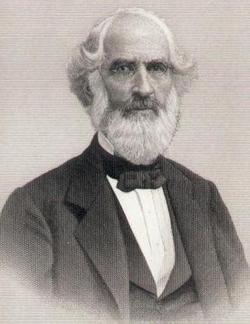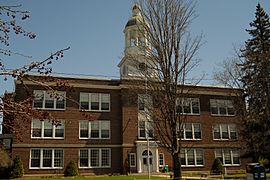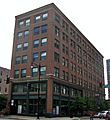Thaddeus Fairbanks facts for kids
Thaddeus Fairbanks (January 17, 1796 – April 12, 1886) was an American inventor and businessman. He created many useful items, like furnaces and cooking stoves. He also invented the first platform scale. This invention, called the Fairbanks scale, made it easy to weigh very large objects accurately.
His scales changed how farming and manufacturing worked around the world. He received many awards for his amazing invention. Fairbanks was also a generous person who helped start the St. Johnsbury Academy.
Contents
Early Life and Inventions
Fairbanks was born in Brimfield, Massachusetts, on January 16, 1796. He was the oldest of three sons. As a boy, he worked on his family's farm. He also showed a natural talent for building things.
Fairbanks had a woodworking shop above his father's sawmill and gristmill. A sawmill cuts logs into lumber, and a gristmill grinds grain. He built carriages there until 1824. Later, he built a factory to work with iron. His brother Erastus joined him to create a company called E. & T. Fairbanks.
They made furnaces, cooking stoves, and farm tools from cast iron. Thaddeus was the inventor, coming up with new ideas. Erastus was the businessman, selling their products. In 1826, Thaddeus received a patent for a refrigerator and a cast iron plow.
Inventing the Platform Scale
In 1830, Fairbanks patented a machine for processing hemp and flax. Hemp is a plant used to make rope and fabric. He became the manager of the Saint Johnsbury Hemp Company. This company used large scales to weigh big loads of hemp straw. However, these scales were not very accurate. It was hard to know how much to pay farmers for their crops.
Fairbanks started working on a better way to weigh things. He invented the platform scale. This new scale changed farming and business forever. It made weighing large items much easier. For example, you could drive a full wagon onto the scale. Then, you would unload it and weigh the empty wagon. By subtracting the empty weight from the full weight, you could find the exact weight of the product.
Fairbanks received a patent for his platform scale. His brothers told him he should make and sell them. So, in 1834, Thaddeus and his brothers, Erastus and Joseph, formed the E. & T. Fairbanks Company. Their goal was to make and sell the Fairbanks platform scale.
Fairbanks scales were shown at many big events around the world. They won gold and silver medals for their advanced technology. Thaddeus also received many awards from other countries. These included an award from the Emperor of Austria and a gold medal from the King of Siam.
Global Success
Fairbanks scales became popular all over the world. Scales sold in other countries used their local measuring systems. They also used the numbers of that country, like Chinese characters. In 1874, the company became the Fairbanks Scale Company.
By 1885, about 1,000 people worked at the main factory in St. Johnsbury. They made 70,000 scales each year! Other factories were built in places like Russia, Japan, and Cuba. In 1916, the company changed its name to Fairbanks, Morse & Company. Even today, Fairbanks platform scales are still made in Saint Johnsbury, Vermont.
Personal Life
In 1820, Fairbanks married Lucy Peck Barker. They had five children, but only two lived to be adults. His son, Henry Fairbanks, took care of him in his later years.
Fairbanks received over 40 patents during his lifetime. His last patent was granted when he was 90 years old! On March 31, 1886, Fairbanks fell and broke his hip. He passed away on April 12, 1886. He was buried at Mount Pleasant Cemetery in St. Johnsbury.
Giving Back
Fairbanks was very involved in helping his community. He supported many charities and public projects. In 1842, he helped start the St. Johnsbury Academy. He paid for the first building, which was made of red brick.
Later, he paid for more buildings for the academy. In 1873, the academy became a school for all boys and girls in grades 9-12.
Fairbanks also helped other organizations. He was on the board of trustees for Middlebury College. He also gave money to support the work of the Congregational church. In 1851, Middlebury College gave Fairbanks an honorary Master of Arts degree.
Images for kids
 | Tommie Smith |
 | Simone Manuel |
 | Shani Davis |
 | Simone Biles |
 | Alice Coachman |















